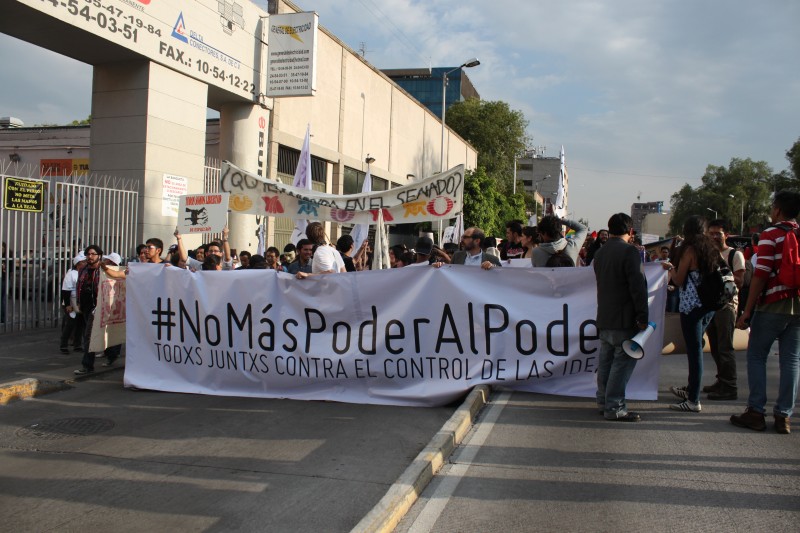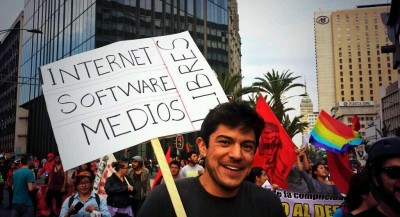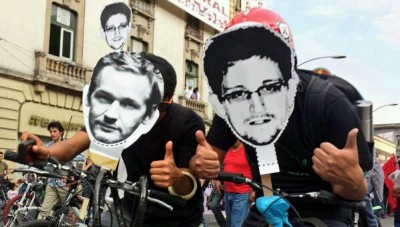
Protesters came out in favor of a public Internet that respects web neutrality and freedom of expression.
By Jacobo Nájera and Alberto R. León. All links in Spanish.
Mexican citizens took to the streets in a demonstration in downtown Mexico City on April 10, in response to President Enrique Peña Nieto's proposed law on telecommunications. According to expert analyses, passing the proposed reforms would affect freedom of expression, net neutrality, privacy, and access to the Internet. The demonstration, dubbed #NoMasPoderAlPoder (#NoMorePowerToThePower) on social networks, was brought together by organizations and groups like AMARC México, Artículo 19, CENCOS, R3D, Centro ProDH, Propuesta Cívica, Libre Internet Para Todos, and ContingenteMX, among others.

Photo by Jesús Robles Maloof (CC BY–SA 2.0)
The march began at Televisa Chapultepec, the site of the largest television network in Mexico, and went to the Senate building, where the changes will be voted on in the coming days.
Billed as an effort to dissolve the notorious telecommunications and broadcasting monopolies of Mexico, the law covers a wide range of topics on electronic communication ─ and tramples on the territory of human rights. At the request of “competent” authorities, the law authorizes telecommunication companies to “block, inhibit, or nullify” communication services “at critical times for public and national security.” The law also allows Internet service providers to offer service bundles that “meet the demands of the market” and to distinguish between “capacity, speed, and quality” ─ a measure that could prevent the protection of net neutrality in the country. What's more, the security measures included in the law would allow authorities to track the activities of users in real time, using geo-location tools, without obtaining prior judicial approval.
Citizen concern extended to the exclusion of Mexico's vulnerable social sectors, like the indigenous population, and to the increase in Internet service costs. It was also stressed that telecommunication is a space of creation, dissemination, and protest, and by approving the amendments to the law, various forms of repression that have been carried out against activists, organizations, and civilians would become codified under national law.

Foto de Jesús Robles Maloof (CC BY-NC-SA 2.0)
Daniel Gershenson, a consumer rights advocate, made it clear that over a year ago, an initiative that aimed to create public networks in Mexico was presented to the Senate. “If they take advantage of the existing infrastructure,” Gershenson told Global Voices, “Internet could be provided to all citizens in the city. Nonetheless, until today this initiative has been ignored by the legislature, who attempted to put the #LeyTelecom modification on the fast track.”
Activist Bosque Iglesias Guzman pointed out that the control of the Internet is just one part of the problem that #LeyTelecom presents, emphasizing the analog blackout that will take place in 2015, when all of the aerial television signals will become digital. For Bosque, this problem brings along more control from the television monopoly, which in Mexico is already great.
Through the Ministry of Foreign Relations, the Mexican government approved the UN resolution on the Right to Privacy in the Digital Age at the end of 2013. Mexico also supported the OAS joint Declaration on monitoring programs and their impact on freedom of expression, which recognized the right to privacy and freedom of expression — the very principles that are violated in the proposed secondary legislation of the Telecommunications Reform — as fundamental to a democratic society.
Global Voices Advocacy has joined international human rights defenders and open technology experts in calling for public consultations on amendments to the Telecommunications Law before they are brought for a vote. Read the letter here in Spanish and here in English.




6 comments